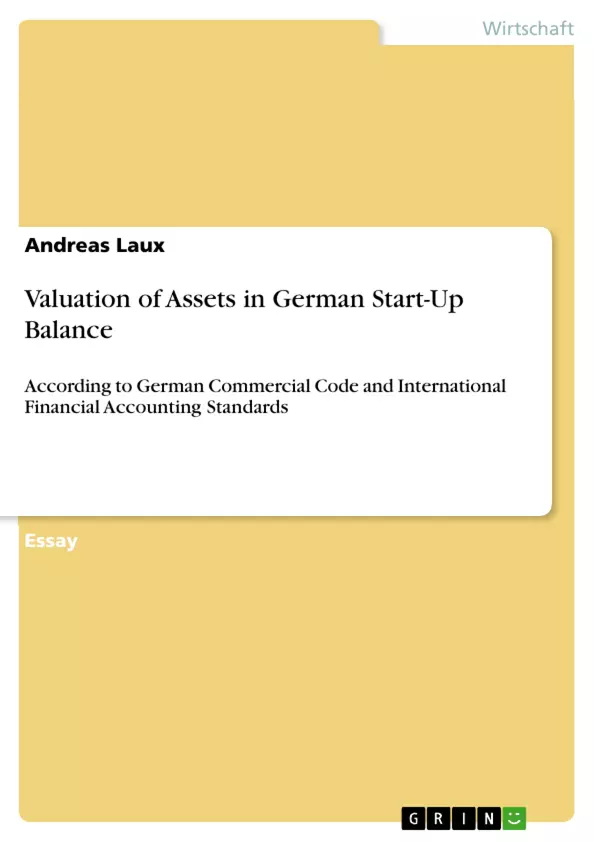Once a founder complies with their commitment to initial contribution in the form of contribution in kind, a question arises about valuation of this in-kind contribution. Given the principle of continuity in fiscal statements between initial balance sheet and future annual statements, valuation of such in-kind contributions needs to refer to provisions of commercial law. However, §§ 242 and 253 of German Commercial Code (HGB) only provide general guidelines to refer in the measurement of in-kind contributions at enterprise formation to acquisition costs, which gives rise to the term of notional acquisition cost. With the regulation gap this leaves, the in-kind contributions can essentially be measured freely under common provisions. The values notional acquisition cost may assume range from fair value as maximum limit to the lower issue price of the shares subscribed as far as hidden reserves have been created.
The author undertakes a comparison of the aims in financial reporting to HGB and IFRS respectively in as far as relevant to valuation of the in-kind contributions, explores the different views on the scope of notional acquisition cost and extracts from the aims of financial reporting to the core question about the essential allowability of hidden reserves in initial balance sheet the key decision making criterion to refer to in valuation of the in-kind contributions. The descriptive exploration of the different views in existing sources as to the scope of notional acquisition costs and the comparative analysis of pertinent provisions of HGB and IFRS respectively give rise to the author’s conclusion and requirement to valuate the in-kind contributions at fair value.
Inhaltsverzeichnis
- Valuation of Assets in German Start-Up Balance
- According to German Commercial Code and International Financial Accounting Standards
- Abstract
- The German Lawmaker does not clearly emphasise either the profit or loss quantification function or the information function of financial statements
- As in-kind contributions amount to separate acquisitions, the valuation rates in the initial balance sheet can be defined without reference to historical costs of the contributor
- There is no doubt that in-kind contributions as part of enterprise formation qualify as acquisitions without which there could be no acquisition cost
- Within IFRS as standard valuation rates, the framework defines historical costs, current cost, realisable value/settlement value and present value
- The valuation rates for notional acquisition cost to German Commercial Code advocated in existing sources range from the issue price through values derived from historical costs of the contributor and intermediate values up to fair value
- The financial reporting rules to IFRS do not provide a profit or loss quantification function
- Overall, the research carries out a comparison of aims in financial reporting to HGB and IFRS respectively as far as relevant to measurement of in-kind contributions, explores the different views on notional acquisition cost and extracts with the principal question of allowability of hidden reserves in initial balance sheet the key decision making criterion to refer to in measurement of the in-kind contributions from the financial reporting aims
- Concerning HGB, there have been demands voiced since some time for a harmonisation with IFRS
Zielsetzung und Themenschwerpunkte
Diese Arbeit analysiert die Bewertung von Sach- und Sacheinlagen im Rahmen der Gründung eines deutschen Unternehmens. Der Fokus liegt dabei auf den Vorschriften des Handelsgesetzbuches (HGB) und den International Financial Reporting Standards (IFRS), um eine eindeutige Antwort auf die Frage zu geben, ob versteckte Reserven in der Eröffnungsbilanz zulässig sind.
- Bewertung von Sach- und Sacheinlagen bei Unternehmensgründung
- Anwendbarkeit des Erwerbswertprinzips im Kontext von Sacheinlagen
- Unterschiede zwischen den Zielsetzungen der Rechnungslegung nach HGB und IFRS
- Zulässigkeit von versteckten Reserven in der Eröffnungsbilanz
- Harmonisierungstendenzen zwischen HGB und IFRS
Zusammenfassung der Kapitel
- Das erste Kapitel legt den Fokus auf die Bewertung von Sacheinlagen im Kontext des deutschen Handelsgesetzbuches (HGB). Es werden die relevanten Vorschriften des HGB erläutert und die Grenzen des Erwerbswertprinzips im Zusammenhang mit Sacheinlagen diskutiert.
- Im zweiten Kapitel werden die unterschiedlichen Zielsetzungen der Rechnungslegung nach HGB und IFRS beleuchtet. Dabei wird besonders auf die Bedeutung des Informations- und Gewinnverrechnungsaspekts in der Rechnungslegung eingegangen.
- Das dritte Kapitel behandelt die Bewertung von Sacheinlagen nach IFRS. Hierbei wird der Fokus auf die Anwendung des Erwerbswertprinzips und die Bedeutung des Fair Value gelegt.
- Im vierten Kapitel erfolgt eine comparative Analyse der Bewertungsansätze nach HGB und IFRS. Besondere Aufmerksamkeit wird der Frage nach der Zulässigkeit von versteckten Reserven in der Eröffnungsbilanz gewidmet.
- Das fünfte Kapitel diskutiert die Harmonisierungstendenzen zwischen HGB und IFRS im Kontext der Bewertung von Sacheinlagen. Hierbei werden die Auswirkungen der Bilanzrechtsmodernisierung (BilMoG) auf die Bewertung von Sacheinlagen betrachtet.
Schlüsselwörter
Die Arbeit beschäftigt sich mit den Kernthemen der Bewertung von Sach- und Sacheinlagen in deutschen Start-Ups. Dabei stehen die Bestimmungen des HGB und IFRS im Vordergrund, insbesondere im Hinblick auf die Zulässigkeit von versteckten Reserven in der Eröffnungsbilanz. Zentrale Begriffe sind: Bewertung von Vermögenswerten, Sacheinlagen, Einlagen in Sachwerten, deutsche Unternehmensgründung, fiktiver Anschaffungspreis, Anschaffungskostenprinzip, Ziele der Rechnungslegung, stille Reserven.
Häufig gestellte Fragen
Wie werden Sacheinlagen bei einer Unternehmensgründung bewertet?
Die Bewertung orientiert sich an den Anschaffungskosten (fiktive Anschaffungskosten), wobei die Werte zwischen dem Fair Value und dem niedrigeren Ausgabebetrag der Anteile liegen können.
Was ist der Unterschied zwischen HGB und IFRS bei der Bewertung?
Das HGB betont oft das Vorsichtsprinzip und die Gewinnermittlung, während IFRS stärker auf die Informationsfunktion und den Zeitwert (Fair Value) fokussiert.
Sind stille Reserven in der Eröffnungsbilanz zulässig?
Die Arbeit untersucht diese Kernfrage und kommt zu dem Schluss, dass Sacheinlagen nach IFRS eher zum Fair Value bewertet werden sollten, was die Bildung stiller Reserven einschränkt.
Was versteht man unter „fiktiven Anschaffungskosten“?
Da bei Sacheinlagen kein direkter Kaufpreis gezahlt wird, muss ein fiktiver Wert ermittelt werden, der als Basis für die zukünftige Bilanzierung dient.
Welchen Einfluss hat das BilMoG auf diese Bewertung?
Die Bilanzrechtsmodernisierung hat Tendenzen zur Harmonisierung von HGB und IFRS verstärkt, was Auswirkungen auf die Bewertung von Vermögenswerten bei Start-ups hat.
- Quote paper
- Andreas Laux (Author), 2011, Valuation of Assets in German Start-Up Balance, Munich, GRIN Verlag, https://www.grin.com/document/188409



